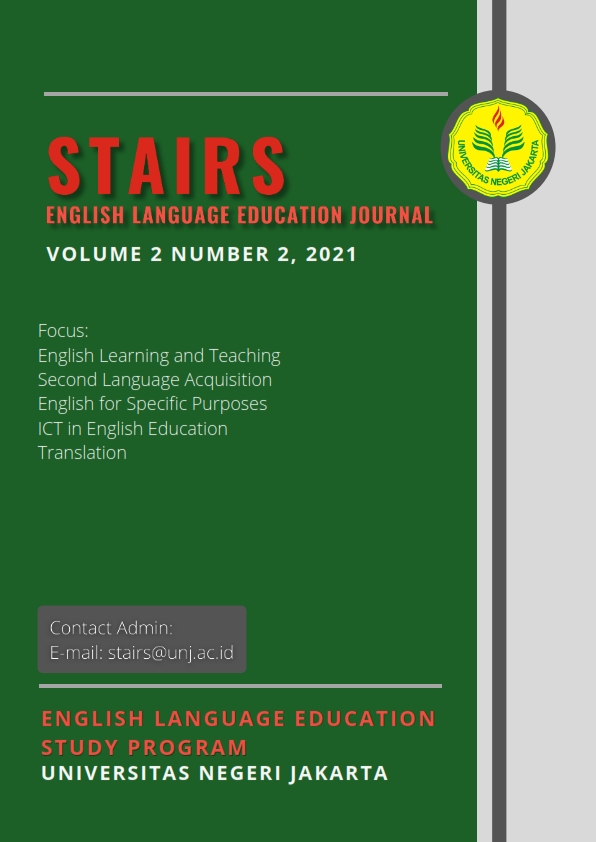The Incorporation of Citizenship Competency in EFL Learning Materials for Senior High School Students
DOI:
https://doi.org/10.21009/stairs.2.2.3Keywords:
Citizenship competency, EFL learning materials, senior high school studentsAbstract
This study aims at analysing the extent to which citizenship competency was incorporated and describing ways citizenship competency was incorporated in EFL learning materials for senior high school students. A content analysis was used to analyse 53 EFL learning materials from four public senior high school teachers in East Jakarta. The findings show that citizenship competency is incorporated in most learning materials. Three learning materials did not incorporate citizenship competency, indicated from the none fulfilment of the indicators. However, the indicators were fulfilled in other learning materials. All factors of citizenship competency are incorporated with skills as the highest in incorporation (34.2%), followed by citizenship knowledge (33.6%), attitudes and values (32.2%). Citizenship competency is incorporated through the incorporation of the significant topics, opportunities to apply and develop citizenship skills, and opportunities related to citizenship attitudes and values. Since the types and forms of learning materials are varied, citizenship competency is incorporated in varied ways. These findings are expected to aid teachers in choosing and incorporating citizenship competency in their learning materials.
References
Binkley, M., Erstad, O., Herman, J., Raizen, S., Ripley, M., Miller-Ricci, M., & Rumble, M. (2012). Defining Twenty-First Century Skills. In P. Griffin, B. McGaw, & E. Care (Eds.), Assessment and Teaching of 21st Century Skills (pp. 17-66). Dordrecht: Springer Science+Business Media B.V. doi:10.1007/987-94-007-2324-5_2
Creswell, J. W. (2014). Research Design: Qualitative, Quantitative and Mixed Methods Approaches (4th ed.). Thousand Oaks, California: SAGE.
Díaz, L. C. (2017). Citizenship Education and the EFL Standards: A Critical Reflection. PROFILE, 19(1), 155-168. doi:10.15446/profile.v19n1.55676
European Commission/EACEA/Eurydice. (2017). Citizenship Education at School in Europe – 2017. Luxembourg: Publications Office of the European Union.
European Union. (2019). Key Competences for Lifelong Learning. Luxembourg: Publications Office of the European Union. doi:10.2766/569540
Fullan, M., Hill, P., & Rincón-Gallardo, S. (2017). Deep Learning: Shaking the Foundation. Ontario, Canada: Fullan,M.,Quinn, J., & McEachen, J. Retrieved from http://npdl.global/wp-content/uploads/2017/03/npdl-case_study_3.pdf
Fullan, M., Quinn, J., & McEachen, J. (2017). Deep Learning: Engage the World, Change the World. SAGE Publications.
Göğebakan-Yildiz, D. (2018). Global citizenship training program for teacher candidates. Academic Journals Educational Research and Reviews, 13(12), 436-446. doi:10.5897/ERR2018.3509
Griffin, P., Care, E., & McGaw, B. (2012). The Changing Role of Education and School. In P. Griffin, B. McGaw, & E. Care (Eds.), Assessment and Teaching of 21st Century Skills (pp. 1-16). Dordrecth: Springer Science+Business Media B. V. doi:10.1007/987-94-007-2324-5_1
Kemendikbud. (2018). Salinan Peraturan Menteri Pendidikan dan Kebudayaan Republik Indonesia Nomor 36 Tahun 2018 tentang Perubahan atas Peraturan Menteri Pendidikan dan Kebudayaan Nomor 59 Tahun 2014 tentang Kurikulum 2013 Sekolah Menengah Atas/Madrasah Aliyah. Jakarta: Kementerian Pendidikan dan Kebudayaan.
Khalil, E. R. (2019). UNDERSTANDING AUTONOMY LEARNERS IN THE 6CS OF ELL. International Journal of Research in Social Sciences and Humanities, 9(IV), 301-311. Retrieved from https://www.researchgate.net/publication/335753888_UNDERSTANDING_AUTONOMY_LEARNERS_IN_THE_6CS_OF_ELL
Kishino, H., & Takahashi, T. (2019). Global Citizenship Development: Effects of Study Abroad and Other Factors. Journal of International Students, 9(2), 535-559. doi:10.32674/jis.v9i2.390
Kohtari, C. R. (2004). Research Methodology: Methods and Techniques (2nd Revised ed.). New Delhi: New Age International Publisher.
Krippendorff, K. (2004). Content Analysis: An Introduction to its Metholodogy (2nd ed.). California: Sage Publications, Inc.
Larsen, M. A., & Searle, M. J. (2017). International service learning and critical global citizenship: A cross-case study of a Canadian teacher education alternative practicum. Teaching and Teacher Education, 63, 196-205. doi:10.1016/j.tate.2016.12.011
Malik, R. S. (2018). EDUCATIONAL CHALLENGES IN 21ST CENTURY AND SUSTAINABLE DEVELOPMENT. Journal of Sustainable Development Education and Research, 2(1), 9-20.
OECD. (2018). Preparing Our Youth. Paris: OECD Publishing.
Reynolds, R., MacQueen, S., & Ferguson-Patrick, K. (2019). Educating for global citizenship: Australia as a case study. International Journal of Development Education and Global Learning, 11(1), 103-119. doi:10.18546/IJDEGL.11.1.07
Ritchie, J., & Lewis, J. (Eds.). (2003). Qualitative Research Practice: A Guide for Social Science Students and Researchers. London: SAGE Publications Ltd.
Shi, Y., Chong, E. K., & Li, B. (2019). Chinese civic education being globalised: What changes have been made in civic education curriculum in China, Hong Kong and Macao. Social Transformations in Chinese Societies, 15(1), 37-63. doi:10.1108/STICS-11-2018-0016
UNESCO. (2015). Incheon Declaration and SDG4 – Education 2030 Framework for Action. For the Implementation of Sustainable Development Goal 4, Ensure Inclusive and Equitable Quality Education and Promote Lifelong Learning Opportunities for All. ED-2016/WS/28.
Voogt, J., & Roblin, N. P. (2010). 21st CENTURY SKILLS. University of Twente, Department of Curriculum Design and Educational Innovation, Enschede.
Zúñiga, C. G., Cárdenas, P., Martínez, R., & Valledor, L. (2019). Teachers’ classroom practices for citizenship education: Experiences of teachers rated as outstanding. Citizenship, Social and Economics Education, 00(0), 1-20. doi:10.1177/2047173419887972



